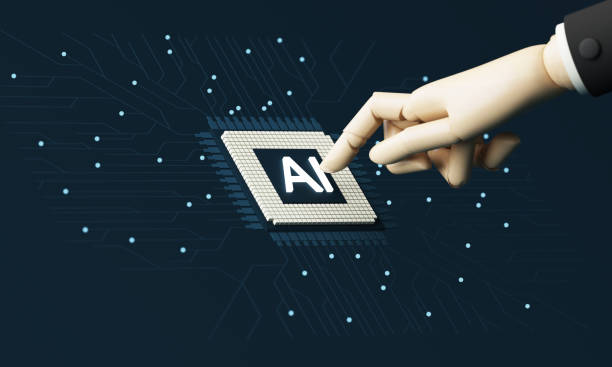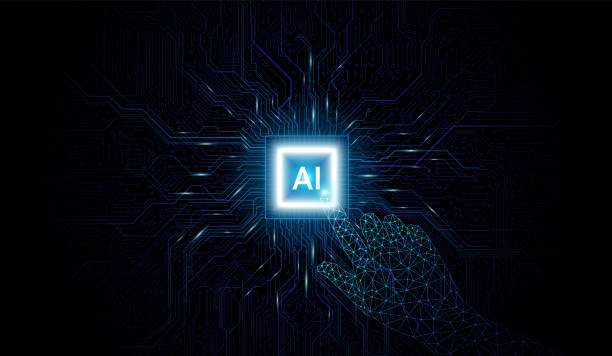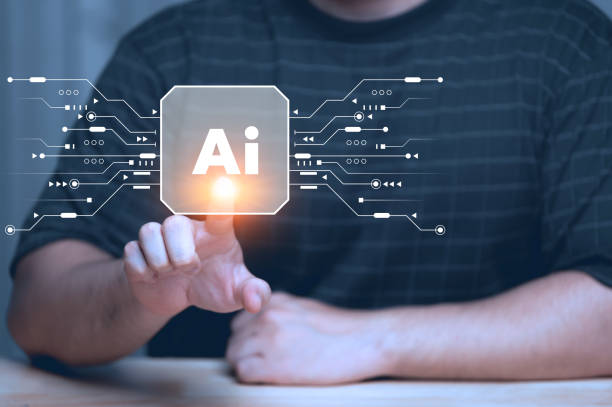What is Artificial Intelligence and Why Does it Matter?

Artificial Intelligence (AI) refers to the ability of a computer system to mimic human cognitive functions such as learning, reasoning, problem-solving, and natural language understanding.
This multidisciplinary field draws on computer science, mathematics, statistics, neuroscience, and philosophy to create machines that can perform tasks that typically require human intelligence.
The importance of #ArtificialIntelligence in today’s world is rapidly increasing.
AI has the potential to transform various industries, including healthcare, automotive, banking, manufacturing, and education.
From early disease detection and the development of new drugs to automating complex processes and providing personalized customer experiences, AI offers countless opportunities to improve human lives and increase productivity.
However, the development and deployment of AI also raise concerns about ethical issues, unemployment, and potential misuse that require serious attention and consideration.
Are you tired of your online store not generating as much revenue as it could? Rasaweb, a specialist in designing professional online stores, will solve this problem for good!
✅ Increased sales rate and revenue
✅ High loading speed and exceptional user experience
⚡ Get a free consultation on online store design
Types of Artificial Intelligence: A Closer Look

Artificial intelligence can be categorized into different types based on capabilities and functions.
In terms of capability, there are two main categories: Narrow AI and General AI.
Narrow AI is designed to perform a specific task and excels in that particular area.
Examples of narrow AI include facial recognition systems, spam filters, and recommendation engines.
General AI, sometimes called strong AI, aims to create systems that can perform any intellectual task that a human can do.
General AI is still in the early stages of development and faces many technical and theoretical challenges.
In terms of function, AI can be divided into four main types:
- Reactive Machines, which act solely based on the current input and have no memory.
- Limited Memory machines, which can store past information for a short period.
- Theory of Mind, which makes it possible to understand and predict the behavior of others based on their mental states.
- Self-Awareness, which is the highest level of AI and allows machines to have self-awareness.
Machine Learning: The Beating Heart of Artificial Intelligence

Machine Learning (ML) is a subset of Artificial Intelligence that allows systems to learn from data without explicit programming.
In fact, instead of the programmer telling the machine how to perform a task, machine learning algorithms extract patterns and rules by analyzing data and improving their performance.
There are different types of machine learning algorithms, each suitable for a specific type of problem.
Supervised Learning uses labeled data to train the model.
Unsupervised Learning discovers patterns in unlabeled data.
Reinforcement Learning trains an agent to act optimally in a specific environment by receiving positive or negative feedback.
Deep Learning uses artificial neural networks with multiple layers to extract complex features from data and performs very well in areas such as image recognition and natural language processing.
Artificial Intelligence and machine learning are widely used in various industries.
For example, in marketing, machine learning algorithms can be used to personalize advertising, recommend suitable products to customers, and predict customer behavior.
In finance, these algorithms can be used to detect fraud, assess risk, and optimize investment.
In the healthcare industry, machine learning can be used to diagnose diseases, develop new drugs, and improve patient care.
In fact, Artificial Intelligence can be applied in any field.
| Machine Learning Algorithm | Application |
|---|---|
| Linear Regression | Predicting housing prices |
| Support Vector Machine Classification | Spam detection |
| Decision Tree | Loan decision-making |
Natural Language Processing and Understanding the Concept of Speech

Natural Language Processing (NLP) is a branch of Artificial Intelligence that allows machines to understand, interpret, and produce human language.
The goal of NLP is to create systems that can communicate with humans in natural language, extract information from text, summarize text, perform machine translation, and provide answers to questions.
NLP uses various techniques, including syntactic analysis, semantic analysis, and discourse analysis.
Syntactic analysis deals with the structure of sentences and identifies relationships between words.
Semantic analysis deals with the meaning of words and sentences and tries to understand their concept.
Discourse analysis deals with the context and overall text of a document and examines the relationships between sentences and paragraphs.
NLP has applications in various fields.
For example, in chatbots and virtual assistants, NLP allows machines to understand user questions and provide appropriate answers.
In search engines, NLP helps to improve search results and provide more relevant information.
In social networks, NLP can be used to analyze user sentiment, identify trends, and detect fake news.
Overall, natural language processing is one of the key technologies in modern Artificial Intelligence.
Do you know that customers’ first impression of your company is your website? With a powerful corporate website from Rasaweb, multiply the credibility of your business!
✅ Custom and eye-catching design tailored to your brand
✅ Improved user experience and increased customer acquisition
⚡ Get a free consultation!
Computer Vision and Understanding Images

Computer Vision (CV) is a branch of Artificial Intelligence that allows machines to understand and interpret images and videos.
The goal of CV is to create systems that can recognize objects in images, understand scenes, track motion, and extract three-dimensional information from images.
Computer vision uses various techniques, including image processing, pattern recognition, and machine learning.
Image processing deals with improving the quality of images and extracting important features from them.
Pattern recognition deals with identifying objects and patterns in images.
Machine learning allows machines to learn from image data and improve their performance.
CV has applications in various fields.
For example, in self-driving cars, CV allows machines to understand their surroundings and move safely.
In medicine, CV can be used to diagnose diseases, analyze medical images, and assist surgeons.
In security, CV can be used for facial recognition, video surveillance, and identifying suspicious activities.
In manufacturing, CV can be used for quality control, automated inspection, and robotics.
Robotics and Combining Artificial Intelligence with the Physical World

Robotics is a field that deals with the design, construction, operation, and application of robots.
Robots are automated machines that can perform tasks that are usually performed by humans.
Robots can work in dangerous, repetitive, or inaccessible environments for humans and increase productivity and safety.
Artificial Intelligence plays an important role in robotics.
Using Artificial Intelligence, robots can understand their surroundings, make decisions, and perform more complex tasks.
Robots equipped with Artificial Intelligence can move independently, identify objects, interact with humans, and even learn and adapt.
Robotics and Artificial Intelligence are combined in various fields.
For example, in manufacturing, industrial robots equipped with Artificial Intelligence can be used to automate production processes, control quality, and logistics.
In medicine, surgical robots equipped with Artificial Intelligence can be used to perform precise and minimally invasive surgeries.
In services, service robots equipped with Artificial Intelligence can be used to assist the elderly, provide services to customers, and perform cleaning tasks.
Challenges and Limitations of Artificial Intelligence

Artificial Intelligence, despite its many potentials, also faces challenges and limitations.
One of the most important challenges is the need for large amounts of high-quality data to train machine learning models.
Insufficient or incorrect data can lead to poor model performance and incorrect decisions.
Another challenge is the interpretability of Artificial Intelligence models.
Many complex models, such as deep neural networks, are known as “black boxes,” and it is difficult to understand how they make decisions.
This can reduce trust in these models and limit their use in sensitive areas such as medicine and law.
| Title | Description |
|---|---|
| Human Commitment | Difficulty in explaining and understanding the decision-making logic of deep learning algorithms. |
| Lack of Generalization | Inability to generalize learning to situations outside of the training data. |
Ethical issues are also among the important challenges of Artificial Intelligence.
Biases in the data can lead to discrimination in Artificial Intelligence decisions.
There are concerns about job losses due to automation, data privacy, and the use of Artificial Intelligence in automated weapons.
To solve these challenges, more research is needed, the development of ethical and legal standards, and public education about Artificial Intelligence.
The Future of Artificial Intelligence: What Can We Expect?

The future of Artificial Intelligence is very promising, and this technology is expected to achieve significant advances in the coming years.
Advances in areas such as deep learning, natural language processing, and computer vision will enable the creation of more powerful Artificial Intelligence systems.
Artificial Intelligence is expected to become more prevalent in various industries and play a more important role in our daily lives.
In the future, we can expect self-driving cars to be widely used, virtual assistants to become smarter and more helpful, medical diagnosis systems to become more accurate and faster, and robots to assist humans in performing various tasks.
Also, Artificial Intelligence can play an important role in solving global problems such as climate change, poverty, and diseases.
However, the development of Artificial Intelligence requires attention to ethical and social issues.
It must be ensured that Artificial Intelligence is used fairly and responsibly and is beneficial to all members of society.
Do you know that customers’ first impression of your company is your website? With a powerful corporate website from Rasaweb, multiply the credibility of your business!
✅ Custom and eye-catching design tailored to your brand
✅ Improved user experience and increased customer acquisition
⚡ Get a free consultation!
The Impact of Artificial Intelligence on Businesses

Artificial Intelligence has a profound impact on businesses around the world.
This technology helps companies automate their processes, make better decisions, personalize customer experiences, and develop new products and services.
In marketing, Artificial Intelligence can be used to analyze customer data, identify patterns, and predict their behavior.
This helps companies optimize their advertising, increase conversion rates, and strengthen customer loyalty.
In sales, Artificial Intelligence can be used to identify potential leads, forecast sales, and provide customer service more effectively.
In manufacturing, Artificial Intelligence can be used to automate production processes, control quality, and optimize the supply chain.
This helps companies reduce their costs, increase productivity, and produce higher quality products.
In human resources, Artificial Intelligence can be used to attract and recruit talent, train employees, and manage their performance.
How to Learn Artificial Intelligence?

Learning Artificial Intelligence requires a combination of theoretical and practical knowledge.
To begin, you can familiarize yourself with the basic concepts of Artificial Intelligence, machine learning, and deep learning.
There are many online resources that can help you with this, including training courses, articles, and videos.
You can also participate in in-person or online training courses offered by universities and educational institutions.
After gaining theoretical knowledge, you should start practicing.
You can do small projects using Artificial Intelligence tools and libraries such as TensorFlow, Keras, and PyTorch.
You can also participate in Artificial Intelligence competitions and compete with other enthusiasts in this field.
Learning Artificial Intelligence requires patience and perseverance.
This field is rapidly evolving, and there are always new things to learn.
With continuous practice and keeping your knowledge up-to-date, you can advance in this field and become an Artificial Intelligence expert.
Frequently Asked Questions
| Question | Answer |
|---|---|
| What is Artificial Intelligence? | It is the simulation of human intelligence in machines programmed to think like humans and mimic their actions. |
| What are the main branches of Artificial Intelligence? | These include machine learning, deep learning, natural language processing, computer vision, and robotics. |
| What is Machine Learning (ML)? | It is a branch of artificial intelligence that focuses on enabling systems to learn from data and identify patterns without explicit programming. |
| Mention examples of AI applications in our daily lives. | Voice assistants (such as Siri and Alexa), recommendation systems in Netflix and Amazon, self-driving cars, and facial recognition programs. |
| What is Deep Learning? | It is a subset of machine learning that uses multiple layers (deep) artificial neural networks to process large amounts of data. |
| What is Natural Language Processing (NLP)? | It is a branch of artificial intelligence that focuses on enabling computers to understand, interpret, and generate human language. |
| What are some of the ethical concerns related to Artificial Intelligence? | These include bias in data, privacy, job losses, and responsibility in case of errors. |
| What are the main benefits of Artificial Intelligence? | Increased efficiency, improved decision-making, automation of repetitive tasks, and discovery of complex patterns in data. |
| How is Artificial Intelligence used in healthcare? | In diagnosing diseases, discovering drugs, analyzing medical images, and providing personalized care to patients. |
| How do you see the future of Artificial Intelligence? | It is expected to continue to evolve at a rapid pace, affecting all aspects of human life, from industry to education and entertainment. |
And other services of Rasa Web Advertising Agency in the field of advertising
Smart Conversion Rate Optimization: A creative platform to improve website traffic by customizing user experience.
Smart Reportage: An effective tool for digital branding with the help of optimizing key pages.
Smart Google Ads: An effective tool to increase website traffic with the help of marketing automation.
Smart Content Strategy: Designed for businesses that seek user engagement through attractive UI design.
Smart Advertising Campaign: A new service to increase customer acquisition through marketing automation.
And over a hundred other services in the field of internet advertising, advertising consulting and organizational solutions
Internet Advertising | Advertising Strategy | Advertising Reportage
Resources
Artificial Intelligence Concepts from 0 to 100
,Introductory Artificial Intelligence Training – Basic Concepts
,What is Artificial Intelligence?
,Introduction to Artificial Intelligence
? For your business to soar in the digital world, Rasaweb Digital Marketing Agency, with expertise in SEO, online advertising, and user-friendly website design, is with you to have a strong and lasting presence.
📍 Tehran, Mirdamad Street, next to the Central Bank, South Kazerun Alley, Ramin Alley No. 6
“`



